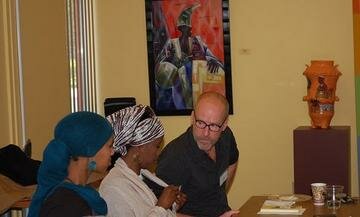Swedish delegation studies successes of Minneapolis Somali immigrants .
 Bartamaha (Minnesota):- Two dozen Swedish delegates-professionals from various governmental and academic entities working in community development-came to Minnesota in October to see first-hand the economic success and integration of the Somali-American community firsthand and to take new ideas home to the growing Somali population in Sweden.
Bartamaha (Minnesota):- Two dozen Swedish delegates-professionals from various governmental and academic entities working in community development-came to Minnesota in October to see first-hand the economic success and integration of the Somali-American community firsthand and to take new ideas home to the growing Somali population in Sweden.
For Benny Carlson, a professor at Lund University in Sweden, this was a return visit. He first came to the Twin Cities in 2005, doing research to help a student write an essay about the Somali-American community in the Twin Cities. After his visit, Carlson not only helped his student write his essay, he also wrote a book about the successful businesses and malls run by Somali-Americans in Minnesota.
The African Development Center of Minnesota (ADC), a nonprofit organization that helps African immigrants establish their own businesses, arranged a week-long program for the Swedish delegates. The reported They visited the Karmel Plaza, one of the largest Somali malls in the Twin Cities (reported by theStar Tribune and MPR), and the American Swedish Institute.
The delegation directly exchanged experiences and ideas with local business leaders. “They are willing to learn and change,” said Hussein Samatar, executive director of the ADC. “We really believe that this is a global idea – no country is isolated. We help each other and send ideas back and forth.”
With the outbreak of the Somali civil war in 1991, fugitives began to emigrate to Sweden and the United States. Ever since, the Somali-community has been an “engine of small business growth” in Minnesota, according to the ADC. In the last ten years alone, according to the ADC, this new community has established four malls and more than 2000 small businesses – a success the Somali community in Sweden has not been able to copy.
“Almost every Somali immigrant is unemployed in Sweden,” said Kenny Sjörberg, an official with the city of Eskiltuna in Sweden. “We want to find a way to create jobs. Minneapolis has shown that one key to labor is the mall. These people start their careers in the malls and then are able to move on to their own businesses.” Sjöberg said they were working on establishing multi-ethnic marketplaces in Sweden, similar to those of Minneapolis.
“It is very fascinating to see how Minneapolis is welcoming new people and showing them how important they are,” said Agneta Carlsson, another official of Eskiltuna. “During this week we had the chance to visit several malls. It was most inspiring to talk to the women, running their own businesses – and thinking how they struggle in Sweden. Here, you see all the energy in the malls and in the whole community.”
Though U.S. regulations do not present as many obstacles as those in Sweden, starting a business is still hard work, said Samatar. “For the Somali-American community when they come over here – business is what they know. For the most part they are entrepreneurs and they are willing to take risks. They believe the way they can build wealth – buy a home, send their children to college – is through business. Sometimes what you believe and reality can be different. It doesn’t mean they will all succeed, but they start a lot of businesses.”
According to Sjörberg and Carlsson, many Somali immigrants in Sweden do not feel the need to follow the path the communities in Minnesota took. Besides tighter regulations, one of the main reasons is the country’s generous welfare system.
“They have a high, unbelievably high social network,” said Samatar. “The downside is that when people arrive it takes a long time for them to get employment, to get actually the permission to work, let alone be part of the labor force,” said Samatar. He believes that this system puts Somalis on the sideline for too long a time – they do not start accessing the language, getting to work and becoming self-sufficient. Because they are living in a limbo in terms of documents, they start to rely on governmental social aid. “After a while you start thinking why do I even have to work when I get what I need without doing a lot of hustle,” said Samatar. “So it becomes a mindset issue for a lot of people. Even if they used to be active – four, five years till you get your documents is a long time to get used to.”
In the United States, Somalis cannot rely on such a welfare system and universal health care, said Samatar. “When people come over here, they know to be able to live, to feed their families they have to work.” Samatar is positive that the Somali community in the Twin Cities has found its way to successfully provide for such a living.
“The Somali-Americans are going to school, they are working hard, they are building businesses, they are buying homes – if we want to define success in America this way, I believe Somali-American are scoring very high. And the community has only been here about 18 years – it is a new community,” Samatar said. “Of course there are issues and we have to deal with them. Of course some struggle and we as a community are not as far as we want to be, but I am extremely hopeful our people will make it.”
==============================
Source:-Twin Cities
Comments
comments
 Calendar
Calendar





































